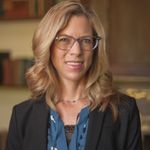
This letter is part of a monthly series from the Director of the CRC, Dr. Michelle Amazeen
August 2021
As the new CRC Director, I am humbled and honored to be stepping into the role formerly held by co-Directors Dr. Mina Tsay-Vogel and Dr. James Cummings and prior to them, Dr. Michael Elasmar. Today, with people more dependent upon media than ever before, the importance of studying mediated communication has intensified. The world is fighting a viral pandemic, political extremism and polarization are on the rise, and new technologies and platforms are emerging at an unprecedented rate. This is all happening against what the World Health Organization has declared an infodemic – “deliberate attempts to disseminate wrong information to undermine the public health response and advance alternative agendas of groups or individuals.” The United States’ Surgeon General has issued a similar advisory, warning against misinformation.
After 18 months of a pandemic-driven hiatus, the CRC is rebooting and ready to provide our fellows with access to the latest biometric technology, social media listening tools, statistical software, and state-of-the art facilities. Lindsy Goldberg joins us as our new Lab and Research Manager, helping to coordinate our lecture events, administer workshops, and provide other activities for our fellows – some of which may also be of interest to journalists, policy makers, and other visitors – as well as assist with facility and equipment rental inquiries.
First established in 1959 with Dr. Edward J. Robinson at the helm, early CRC research focused on the effects of television and comics. These were common areas of study in the growing field of mass communication research as there was great concern in the U.S. with what these new media (of the day) were doing to our youth and how these media were gratifying the needs of audiences. CRC fellows still produce research on television – in the effects tradition as well as from political economic perspectives and alternate paradigms – and on comics (the stand-up kind). But we also address emerging media technologies while identifying opportunities to improve civic engagement, media literacy, and prosocial uses of and representations in media. And given the current state of affairs, many of our fellows are also researching varying aspects of truth and misinformation.
As a new academic year begins, I welcome back our fellows as they continue to embark upon advancing theory and methods in addressing society’s communication challenges. For visitors, I invite you to look to the work of our CRC fellows for informative insights on battling misinformation and other efforts to conduct communication research for social good.